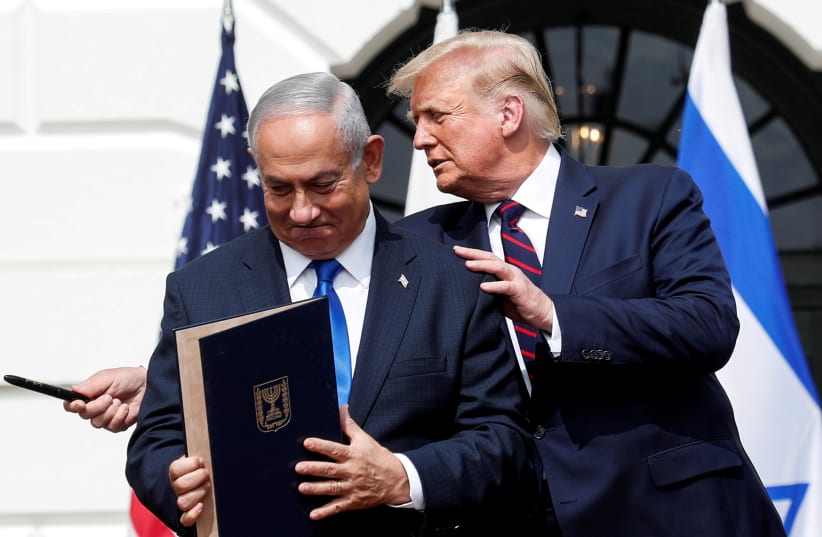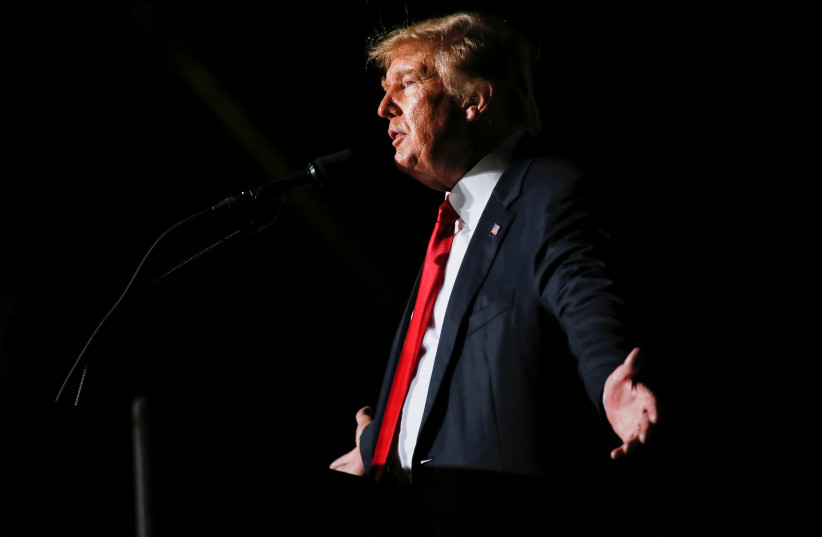“If I were in office, this deadly Ukraine situation would never have happened!” former US president Donald Trump said last week in a statement after Russia invaded Ukraine.
And many Americans believe him.
According to a Harvard Center for American Political Studies-Harris Poll survey released Friday, 62% of those polled believed Putin would not have sent Russian tanks into Ukraine if Trump had won the 2020 elections.
In Israel, though no polling is available, some supporters of former prime minister Benjamin Netanyahu are pining for his leadership during this crisis.
Former IDF spokesman Ronen Manelis, who was director-general of the Strategic Affairs Ministry from 2020-2021, suggested that Prime Minister Naftali Bennett appoint Netanyahu – who is doing everything in his power to undermine the Bennett government – as special envoy to the Russia-Ukraine negotiations.
And Likud MK Galit Distal Atbaryana, one of the most fervent Netanyahu supporters in the Knesset who has mocked Bennett’s offers to mediate in the crisis, tweeted soon after the Russian invasion that Foreign Minister Yair Lapid’s foreign policy was based on a combination of “John Lennon’s [song] ‘Imagine’ and fortune cookies.”
By contrast, she said, Netanyahu’s worldview “was based on the painful realization that everything starts and ends with interests, money, strength and a balance of terror. In a correct world, Netanyahu would be at the wheel and Lapid would be writing catchy pop songs for Rita, something he wasn’t all that bad at.”
In other words, both in the US and in Israel some believe that if only the leaders that were in power two years ago were still in power today, everything would look different; as if the world was humming along in perfect harmony when Trump and Netanyahu were leading their countries.
John Bolton, who was Trump’s national security advisor for some 18 months in 2018-2019 and left the job on very bad terms – penning a memoir shortly afterward slamming Trump – doesn’t think so.
In an interview with an Indian television program just before the Russian invasion, Bolton said that if Trump had won reelection, “Russian troops would be in Kyiv already.” Not, he said, because of any understanding between the two men – critics said they were overly cozy – but “because I think Trump had no understanding, no realization, of what the loss of Ukraine to Russian control would have for the security of Europe. He was more concerned about finding Hillary Clinton’s computer server. He was more concerned about the allegations that Joe Biden’s son was making money off the Ukrainians, and this web of conspiracy theories.”
According to Bolton, Trump – who boasted how this current war would never have happened under his leadership – “badly damaged Ukrainian-US relations, and I think that were he elected, Putin would have seen the opportunity right there to fracture NATO. The problem is that Biden’s response is not as weak as Trump’s might have been, but I don’t think it is adequate.”
It is worth recalling when hearing voices declaring that Trump would have been much tougher than Biden on Russia, and would have taken stronger actions to defend Ukraine, that the former president was impeached in 2019, though not convicted, for allegedly withholding nearly $400 million in military aid from Ukraine – which was trying to prepare precisely for the eventuality that has now unfolded – unless the Ukrainians investigated his political rivals, including Biden.
Bolton takes issue with those conservative pundits who say that Trump projected a stronger image and that, for Putin, Biden’s chaotic withdrawal from Afghanistan was the equivalent of waving red meat in front of a hungry lion.
“I don’t think he was stronger,” Bolton said of Trump. “I think he was more blustery than Biden, but I think Trump made very clear he wanted out of Afghanistan. It is easier to say – as he has said – that he would have done [the Afghanistan withdrawal] better, but I think the withdrawal would have looked almost as catastrophic. The strategic point would have been the same: An American withdrawal, whether executed well or executed poorly, was a strategic mistake.”
Moreover, during his four years in office, Trump played to the isolationist strain in American politics, pledging to end America’s involvement in “ridiculous endless foreign wars.”
Trump fanned the sentiment of Americans not fighting other people’s war – though he by no means created that sentiment – and now that sentiment can be felt in a CNN poll Monday showing that five days into the Russian invasion, US public opinion is against American troop involvement.
Although Americans overwhelmingly favor increased sanctions against Russia, by a 58% to 42% margin they oppose direct military action even if the sanctions do not work. Trump had something to do with fostering the idea that the US does not have to be the world’s policeman. The only problem with the sentiment that the US does not need to act as the world’s policeman is that less savory actors will take advantage of an unpoliced world.
Regarding Netanyahu, it is also unrealistic to believe that were the former prime minister still in power, Israel’s policies regarding this conflict would be significantly different.
Israel would still be walking a tightrope between Russia and the US; on the one hand trying to avoid antagonizing the Russians, thereby complicating relations with a country on Israel’s northern doorstep with the ability to significantly complicate Israel’s ability to operate in Syrian and Lebanese airspace against Iranian assets; and on the other hand, being firmly in the camp of the Western liberal democracies decrying Putin’s naked aggression.
Yes, Netanyahu might have had a good relationship with Putin, but that doesn’t mean he would have been able to mediate between his friend and Ukrainian President Volodymyr Zelensky or convince Putin of the folly of a Ukrainian invasion. It’s one thing to get Putin to release Naama Issachar, the Israeli woman arrested in Moscow after 10 grams of hashish were found in her suitcase, and quite another to free Ukraine.
Furthermore, while Netanyahu and his allies often boasted of the former premier’s close ties with Putin, alongside with his close ties to Trump, many in Washington’s foreign policy establishment were not exactly enamored of that relationship.
While today there is a degree of understanding in Washington as to why Israel is not taking a more forceful position regarding Russia, were Netanyahu – seen by many in the US capital as too close with Putin and other authoritative leaders – still in power, this might not necessarily have been the case.
Were Netanyahu in power, there would be those in the US capital interpreting Israel’s soft position in this conflict not as a desire to avoid antagonizing an important state that could cause enormous problems for Israel, but rather the product of that close relationship between Netanyahu and Putin. Were Netanyahu in power, there would be those who would be pointing to that relationship and saying that when it comes to Russia in Ukraine, Israel is guilty by association.

